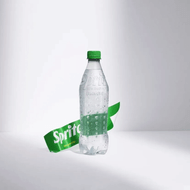From Sprite to Evian: The Label-Less Revolution in Beverage Packaging
Posted by Emily on 18th Mar 2024 Reading Time:
In a pioneering move towards sustainability, Coca-Cola has embarked on an experiment in the UK by removing labels from Sprite bottles. This trial is not just about reducing packaging waste; it's a test of branding in an era increasingly defined by environmental concerns. By presenting bare bottles on shelves, Coca-Cola challenges conventional marketing wisdom, raising a critical question: Can beverage brands maintain their market presence without the traditional labels that have long been their hallmark?
![]()
The decision to go label-less is driven by a dual ambition: to reduce the use of packaging materials and to simplify the recycling process. Labels, despite being recyclable, complicate recycling by necessitating separation from bottles. Coca-Cola's innovative approach involves embossing logos directly onto the bottle and using laser-engraved information, maintaining brand recognition while fostering an easier recycling pathway.
This concept of minimalistic packaging is not entirely new. In 2020, Danone's Evian brand launched a label-free bottle, distinguished by its engraving and a distinctive pink cap, to become a fully circular brand by 2025. Despite its limited distribution, mainly in the French hospitality sector, Evian's initiative highlighted the potential for brands to stand out through unique design elements rather than conventional labels.
Sprite's UK trial, taking place in select Tesco Express stores, builds on these earlier experiments. By assessing consumer reactions to label-less bottles in a real-world retail environment, Coca-Cola aims to understand the viability of this approach in crowded, competitive shelves where visibility is key to sales.
The venture into label-less packaging is not without precedent; Sprite and Coca-Cola have previously conducted similar trials in Asian markets. However, this marks the first time the concept has been tested on single-unit, on-the-go bottles in-store, presenting a novel challenge in balancing environmental goals with market demands.
The sustainability push extends beyond the beverage industry. Australian wine company Fourth Wave Wines introduced a label-less wine called Crate, leveraging the capsule around the bottle opening to convey all necessary brand information. This approach eliminates the need for traditional labelling materials, emphasising sustainability while creating a unique brand identity that captures consumer attention.
![]()
The movement towards minimalism and sustainability is gaining momentum across various sectors, reflecting a broader consumer shift towards environmentally friendly choices. According to design competition Pentawards, luxury brands increasingly adopt minimalist packaging designs to enhance sustainability and appeal to eco-conscious consumers.
Yet, transitioning to sustainable packaging practices, such as removing labels, poses challenges. It demands creativity in branding and a deep understanding of consumer behaviour. While sustainability is a growing preference among consumers, the impact of such initiatives on brand recognition and loyalty remains to be fully understood.
Coca-Cola's label-less Sprite trial in the UK is a small but significant step in exploring how brands can align with environmental values without compromising their identity. As this experiment unfolds, it will provide valuable insights into the future of packaging design and brand communication in an increasingly eco-conscious market.
We're eager to hear your thoughts on this innovative approach to packaging and branding. Do you think label-less bottles will become the new norm in the beverage industry? Share your views and insights in the comments below.

